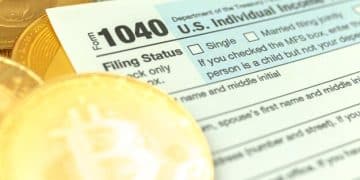Crypto tax compliance tips for investors

Crypto tax compliance tips for investors include tracking transactions accurately, understanding tax obligations for various activities, organizing documentation, and planning ahead to avoid penalties during tax season.
Crypto tax compliance tips for investors can feel overwhelming, right? But getting your taxes in order is essential to avoid hefty penalties. Let’s dive into some practical strategies.
Understanding crypto tax laws
Understanding crypto tax laws is crucial for any investor involved in the digital currency market. Staying informed about these regulations helps you avoid costly penalties and ensures you’re compliant during tax season.
In the U.S., the Internal Revenue Service (IRS) treats cryptocurrencies as property rather than currency. This means that each transaction may have tax implications, which can be confusing. It’s important to know how to report gains and losses accurately.
Key Regulations to Know
Several key regulations impact how you report and pay taxes on your crypto transactions. Here are some of the essentials:
- You must report any capital gains or losses when you sell or exchange cryptocurrency.
- Income received in cryptocurrency is taxable at its fair market value on the date of receipt.
- Inadequate record-keeping can lead to significant penalties.
Moreover, many taxpayers forget that they need to report not just sales but also exchanges between different cryptocurrencies. For instance, swapping Bitcoin for Ethereum is considered a taxable event. Therefore, maintaining clear records of each transaction is paramount.
Importance of Accurate Record-Keeping
Without precise records, calculating your tax responsibility becomes a daunting task. You should track:
- The date of the transaction
- The types of cryptocurrencies involved
- The value of the cryptocurrencies at the time of exchange
Utilizing crypto tax software can streamline this process, allowing you to generate reports with ease. These tools can automatically pull transaction data from your wallets and exchanges, making tax reporting as simple as possible. Furthermore, understanding your tax obligations can also help you identify potential deductions, such as transaction fees.
As regulations surrounding cryptocurrency evolve, staying updated is necessary. Following official IRS guidelines can keep you compliant and potentially save you money when filing. Staying educated on upcoming changes in legislation can further enhance your **crypto tax compliance** strategy.
Common mistakes to avoid
Investing in cryptocurrency can be exciting, but it also comes with its challenges. Many investors make common mistakes that can lead to unnecessary penalties or losses. Knowing what to avoid can save you time and money.
Overlooking Tax Obligations
One of the biggest pitfalls is ignoring tax obligations. Many believe that because cryptocurrencies are new, they don’t have to report them. This is not true. The IRS requires that all digital currency transactions be reported, and failing to do so can result in hefty fines.
- Always report profits from sales or trades.
- Include all income received in cryptocurrency.
- Keep accurate records to support your claims.
Sometimes, investors might forget to report smaller transactions, thinking they won’t matter. However, every transaction contributes to your overall financial picture.
Failing to Track Transactions
Another common mistake is failing to keep thorough documentation of your transactions. Without detailed records, determining your gains or losses can become complex. Maintaining precise records is essential for accurate tax reporting.
- Record dates and times of transactions.
- Document the value of cryptocurrency at the time of each transaction.
- Use software tools to help manage your records.
Additionally, some investors confuse different types of transactions. For instance, exchanging one cryptocurrency for another is also a taxable event. This can easily lead to errors in reporting if not documented properly.
Rushing Tax Filings
Many investors tend to rush through their tax filings, which can lead to mistakes. It’s crucial to take your time and ensure everything is accurate. Double-check your calculations and make sure all transactions are included. Late filings can also result in penalties.
Forgetting about potential deductions is another issue. Transaction fees paid while trading can sometimes be used as deductions on your tax return. This could lower your overall tax liability if properly accounted for.
Staying informed and avoiding these common mistakes can help you enjoy your investment journey while staying compliant with the law. Keep learning about crypto tax compliance to ensure a smooth experience.
Tracking your crypto transactions

Tracking your crypto transactions is a vital aspect of managing your investments effectively. Without proper records, reporting your taxes can become a daunting challenge. Most importantly, having a clear transaction history helps you know your financial standing.
Importance of Accurate Tracking
Maintaining accurate records of your crypto transactions prevents confusion during tax season. Each trade, purchase, or transfer must be documented to ensure compliance with IRS regulations.
- Monitor all transactions, including purchases and sales.
- Keep track of exchange rates at the time of each transaction.
- Document any fees paid during transactions.
Without this information, you may underreport gains or overstate losses, leading to potential penalties. It’s essential to be diligent about recording every transaction you make.
Tools for Tracking
There are various tools available to help you track your transactions efficiently. Crypto tax software can automate much of the process, making it easier for you to compile your records. Here are some popular options:
- CoinTracking: Offers comprehensive tracking and tax reporting.
- Koinly: Simplifies tax calculations and transaction tracking.
- TaxBit: Integrates with exchanges for seamless tracking.
Using these tools can save you time and reduce errors during tax season. They often provide features such as importing wallet data directly, which can significantly simplify the tracking process.
Additionally, it’s wise to classify your transactions. For example, separate purchases of cryptocurrency from sales and trades. This way, you can easily calculate your capital gains and losses without confusion. Regularly reviewing your transaction history will help ensure your records remain accurate and up-to-date.
In summary, tracking your crypto transactions meticulously not only aids in tax compliance but also helps you manage your investments more effectively. Implementing a solid tracking system can help you avoid future headaches and stay organized.
Tax implications of different crypto activities
Tax implications of different crypto activities can vary significantly and understanding these differences is crucial for compliance. Engaging in various activities with cryptocurrencies, such as trading, mining, or earning interest, each comes with its own set of tax responsibilities.
Trading and Selling Cryptocurrencies
When you trade or sell cryptocurrency, you typically realize gains or losses. This means that if you buy Bitcoin for $1,000 and later sell it for $1,500, you have a capital gain of $500. Conversely, if you sell it for $800, you incur a loss. It’s important to report these amounts accurately during tax season.
- Short-term gains are taxed at your regular income tax rate.
- Long-term gains, from holding for more than a year, may benefit from reduced tax rates.
This categorization can significantly impact how much tax you owe, so be mindful of the timelines when you buy and sell.
Mining Cryptocurrency
Mining cryptocurrency is another activity that has specific tax implications. When you successfully mine coins, the fair market value of the coins at the time of receipt is considered taxable income. This income is taxed at your ordinary income tax rate.
- Keep track of all your mining expenses, as some may be deductible.
- Your equipment and electricity costs related to mining could be used to offset your income.
It’s essential to report this income in the year you receive the coins, as failing to do so may lead to penalties later.
Earning Interest or Staking
Another area of crypto activity that impacts taxes is earning interest through lending platforms or staking tokens. The IRS treats this type of income similarly to job income. You must report the fair market value of any rewards accrued.
Staking can be tricky, as you often don’t sell your tokens but still earn income. This income should also be reported in the year you receive it. As this space rapidly changes, be sure to stay updated on guidelines and best practices.
Understanding the tax implications of these different crypto activities will help you avoid costly mistakes and ensure compliance with the IRS. Emphasizing thorough record-keeping and proper reporting will pave the way for a smoother tax experience.
Planning for tax season with crypto
Planning for tax season with crypto is essential for every investor. As the tax season approaches, being prepared can help you avoid last-minute stress and potential issues with the IRS.
Organizing Your Documentation
First, it’s important to gather all necessary documents related to your cryptocurrency transactions. This includes records of trades, sales, and any income received. Keeping a well-organized collection of documents will make filing your taxes much easier.
- Track all your transactions, including dates and amounts.
- Document your profits and losses in a clear format.
- Save any relevant communication from exchanges regarding your transactions.
Establishing a consistent method of record-keeping throughout the year can save you a lot of headaches when tax time arrives. Utilize spreadsheets or crypto tax software to maintain accurate records.
Understanding Your Tax Obligations
It’s crucial to understand how different crypto activities are taxed. For instance, trading or selling your assets may result in capital gains that must be reported. Make sure you know the tax implications of:
- Buying and selling cryptocurrencies.
- Mining or staking cryptocurrencies.
- Receiving cryptocurrency as income.
By understanding these obligations, you can better estimate your tax liability and avoid surprises when it’s time to file.
Setting Aside Funds for Taxes
During the year, it’s wise to set aside funds to cover your tax bill. Given the volatility of cryptocurrencies, the amount you owe can change significantly by the time tax season arrives. To prepare, consider setting aside a portion of any gains you receive. This can help ensure you’re ready to pay any taxes owed.
Planning for your potential tax obligations reduces the risk of being unprepared and facing penalties. Additionally, check for any possible deductions related to your crypto activities to maximize your potential return.
Ultimately, being proactive in your tax planning will enhance your overall investment experience and ensure you remain compliant with tax laws.
FAQ – Frequently Asked Questions about Crypto Tax Compliance
What should I track for my crypto transactions?
You should track the date, amount, type of transactions, and the value of your cryptocurrencies at the time of each transaction.
How do I report cryptocurrency income?
Cryptocurrency income must be reported as ordinary income at its fair market value on the date received.
What are common mistakes to avoid during tax season?
Common mistakes include overlooking tax obligations, failing to track transactions, and rushing tax filings, which can lead to penalties.
Why is planning important for crypto tax season?
Planning helps you stay organized, avoid last-minute scrambles, and ensure compliance with tax laws, helping you save time and money.





